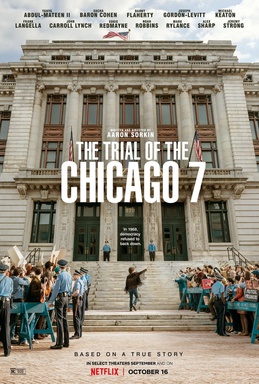
Here is another late, quick review.
Aaron Sorkin is an incredibly talented writer and director. However, he is constantly hobbled by his own sense of self-righteousness.
The Trial of the Chicago 7 is the story of seven men who are accused of conspiring to start a riot outside the Chicago Democrat Convention. Sorkin portrays them as a mixed bag of idealists and cynics. But all of them are completely righteous at their core because they oppose the Vietnam War. In Sorkin's mind, this excuses nearly all legal and personal infractions.
If you know the history of the trial, it is clear that the judge (Frank Langella), did a terrible job and did horrible things like literally ordering on of the defendants gagged. But the movie comes off less like an insightful political film, but it is instead like hagiographic political martyrdom.
There is a strange phenomenon that I have seen in some films where the audience is supposed to put up with or excuse a character's vices as long as they have the correct ideology. To be sure, characters who are complicated and struggle with the contradictions of human life tend to me more interesting that flat, static characters. But Sorkin heavily leans on his audience so that we are supposed to say, "Well, yes, personally this person is a jerk. But they are standing up for a noble cause, so that makes them heroic." There is this wall between someone's personal life and their public one, as if one could be corrupted but not the other. You can see this especially in the character of Abbie Hoffman (Sasha Baron Cohen), who is egotistical and self-aggrandizing, but Sorkin holds him up not for balanced judgment, but for grudging admiration. College student Tom Hayden (Eddie Redmayne) at one point vandalizes a police car, but we are meant to see the police as the villains because they are keeping tabs on the activists. The irony that the activists behave violently to the cops, thus justifying the suspicion, seems completely lost on Sorkin.
It is difficult to express how noxious this is to me. Your character is who you are, both personally and publicly. I remember watching a movie once called Welcome to the Rileys, where it begins by showing the husband cheating on his wife. What threw me was that he was the main character with whom we were supposed to identify. But his behavior was so disgusting that I could never connect. The Trial of the Chicago 7 does the same thing, but with a political twist. To see the opposite, look at Steven Spielberg and Tony Kushner's Lincoln. The character of Thaddeus Stevens is a cynical misanthrope, but he is working hard for the cause of abolition. While his ideals are good, Spielberg wisely holds Stevens up to scrutiny so that you as the audience member get to make the decision about his righteousness. Sorkin does not give you this freedom.
Because Sorkin keeps his thumb on the scales, his critique of his opposition is hollow. In the movie God's Not Dead, every single non-believer is portrayed as kind of monstrous. This makes the film's themes less engaging. Sorkin does this often in his work, where his political opponents are nothing by cinematic straw-men to be easily dispatched by these heroes. The only thing that makes this movie at all enjoyable are the performances from such talents as Cohen, Yahya Abdul-Mateen II, Mark Rylance, Joseph Gordon-Levitt, and Michael Keaton. But they are not enough to keep Sorkin from drowning his talent in his ideology. If he had decided to make an insightful critique of the justice system instead of a sermon extolling his political heroes, then this movie could have been something worth watching.


No comments:
Post a Comment